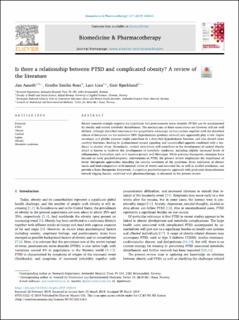| dc.contributor.author | Aaseth, Jan | |
| dc.contributor.author | Roer, Grethe Emilie | |
| dc.contributor.author | Lien, Lars | |
| dc.contributor.author | Bjørklund, Geir | |
| dc.date.accessioned | 2020-03-26T08:55:55Z | |
| dc.date.available | 2020-03-26T08:55:55Z | |
| dc.date.created | 2019-06-20T11:06:30Z | |
| dc.date.issued | 2019 | |
| dc.identifier.citation | Biomedicine and Pharmacotherapy. 2019, 117 . | en_US |
| dc.identifier.issn | 0753-3322 | |
| dc.identifier.uri | https://hdl.handle.net/11250/2648762 | |
| dc.description.abstract | Recent research strongly supports the hypothesis that posttraumatic stress disorder (PTSD) can be accompanied by obesity and related metabolic disturbances. The mechanisms of these associations are however still not well defined, although disturbed functions in the sympathetic-adrenergic nervous system together with the disturbed release of hormones via the endocrine HPA (hypothalamic-pituitary-adrenal) axis apparently play a role. Leptin resistance and ghrelin excesses might contribute to a disturbed hypothalamic function, and also disturb other cerebral functions, leading to dysfunctional reward signaling and uncontrolled appetite combined with a tendency to alcohol abuse. Secondarily, cortisol stimulation will contribute to the development of central obesity which is known to facilitate the development of metabolic syndrome, including slightly increased levels of inflammatory biomarkers such as C-reactive protein and fibrinogen. While previous therapeutic strategies have focused on early psychotherapeutic interventions in PTSD, the present review emphasizes the importance of better therapeutic approaches regarding the somatic correlates of the syndrome. Strict regulation of dietary meals and food composition with minimal intake of sweets and saturated fat, as well as alcohol avoidance, can provide a basic therapeutic framework. A cognitive psychotherapeutic approach with graduated desensitization toward trigging factors, combined with pharmacotherapy, is discussed in the present review. | |
| dc.language.iso | eng | en_US |
| dc.relation.uri | https://www.clinicalkey.com/service/content/pdf/watermarked/1-s2.0-S0753332219308613.pdf?locale=en_US&searchIndex= | |
| dc.rights | Attribution-NonCommercial-NoDerivatives 4.0 Internasjonal | * |
| dc.rights.uri | http://creativecommons.org/licenses/by-nc-nd/4.0/deed.no | * |
| dc.title | Is there a relationship between PTSD and complicated obesity? A review of the literature | en_US |
| dc.type | Peer reviewed | en_US |
| dc.type | Journal article | en_US |
| dc.description.version | publishedVersion | |
| dc.source.pagenumber | 6 | en_US |
| dc.source.volume | 117 | en_US |
| dc.source.journal | Biomedicine and Pharmacotherapy | en_US |
| dc.identifier.doi | 10.1016/j.biopha.2019.108834 | |
| dc.identifier.cristin | 1706362 | |
| cristin.ispublished | true | |
| cristin.fulltext | original | |
| cristin.qualitycode | 1 | |

